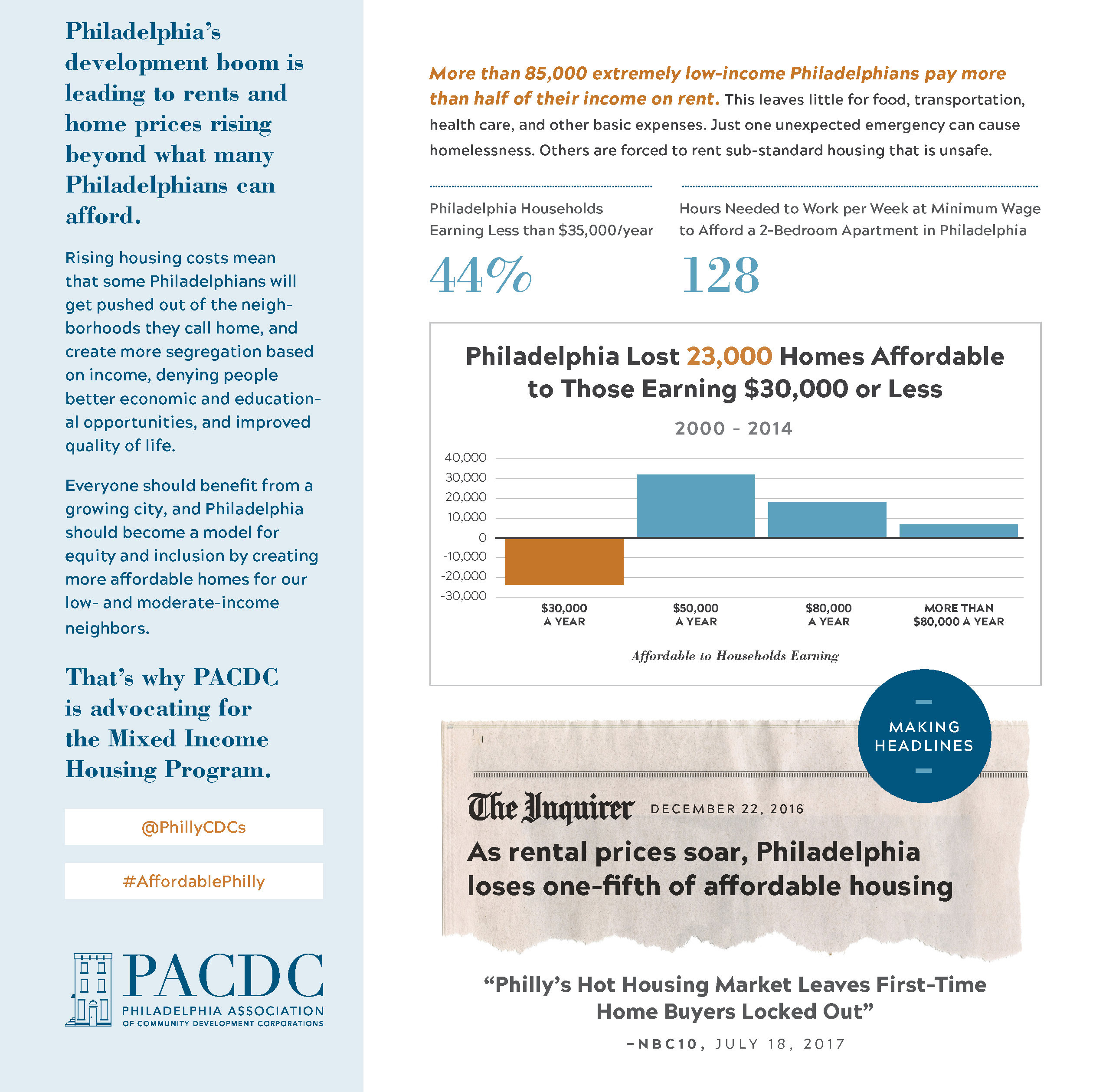Affordable Homes for a Growing Philly
What's the Latest?
PACDC achieved a victory in our campaign Affordable Homes for a Growing Philly when Mayor Kenney signed Bill No 170678-AAA to create the Mixed Income Housing program in October, 2018.
The program allows developers to use density bonuses if they either provide affordable units on site, or pay a fee in lieu for the Philadelphia Housing Trust Fund. Any affordable rental units provided on site must be available to households between 50% – 60% Area Median Income, and the affordable for-sale to households between 70% – 80% AMI. A report from the Philadelphia Department of Planning and Development says that in the first year of the program, developers paid more than $2.3 million to the City in in-lieu payments, and another $5.8 million was projected for projects that received zoning permits but were not yet complete. The program led to four homes for low-income families, with another four projected for projects in the pipeline that year.
This victory was the outcome of a multi-year effort by PACDC that also included our campaign Can’t Wait to Be Home: Double the Housing Trust Fund which led to legislation to create a Construction Impact Tax that passed Council but was withdrawn September 2018 in favor of an agreement to approve the Mixed Income Housing bill in conjunction with a commitment of more than $70 million for the Housing Trust Fund over FY19 – FY23.
Archival News
June 2018: Mixed Income Housing Bill Passes City Council
In June of 2017, Bill No. 170678 to create a Mixed Income Housing Program in Philadelphia was introduced into City Council by Councilwoman Quinones-Sanchez, Council President Clarke, Councilmembers Blackwell and Johnson. Over the past year, PACDC worked to build support for the bill among members of Council, the Kenney Administration, and other stakeholders.
The amended final version that passed Council unanimously on June 21, 2018 creates a voluntary program that provides developers with density bonuses if they set aside 10% of their units for income-restricted households. For rental homes, households between 50% – 60% Area Median Income (AMI) would be eligible for the affordable units, and for-sale homes would benefit those between 70% – 80% AMI (check out this table to learn about AMI income eligibility limits). Monthly housing expenses would be limited to 30% of the income of the tenants or buyers. The units would remain affordable for 50 years.
By providing the homes on site at the development, low- and moderate- income Philadelphians can secure quality homes they can afford in higher-income neighborhoods. By making a payment to the Philadelphia Housing Trust Fund, funds can be used to improve our lower-income neighborhoods by creating more affordable homes or preserving or repairing existing affordable homes, and helping our neighbors who are facing homelessness. Since the HTF was created in 2006, 75% of the funds have supported households under 30% AMI.
Check out this Op-Ed on the legislation from PACDC’s Beth McConnell, and Rasheedah Phillips of Community Legal Services, which ran in the Philadelphia Inquirer on November 17, 2017.
June 2018: Construction Impact Tax Passes City Council!
As companion legislation to the Mixed Income Housing legislation, Bill No. 180351 was introduced on April 18, 2018 to assess a mandatory 1% Construction Impact Tax on all developments that otherwise qualify for the 10-Year Tax Abatement. The bill was spearheaded by Councilmembers Mark Squilla and Maria Quinones Sanchez, and Council President Darrell Clarke. Check out this Op-Ed in the Inquirer from PACDC’s Board President Maria Gonzalez.
Revenue generated from the tax would be deposited into a new sub-fund of the Philadelphia Housing Trust Fund to support preservation and repair of existing affordable homes, development of new affordable homes, and first-time home-buyer assistance programs. The bill is projected to raise $20 million or more per year for the Housing Trust Fund, and represents a first start in returning something to low- and moderate-income Philadelphians that have subsidized the building of high-end, market rate homes and apartments through the 10-Year Tax Abatement. The tax is roughly equivalent to clawing back one year of the abatement subsidy.
A public hearing was held on Bill No. 180351 on June 6, and you can check out these articles about the hearing from PlanPhilly and Philly.com. News coverage of the final vote in Council include the Philly.com editorial and story, and this story from PlanPhilly.
You can read PACDC’s testimony, and that of our members, below:
Will Gonzalez of CEIBA
Corrine O’Connell of Habitat for Humanity Philadelphia
Frederick Rivera of FINANTA
Kevin Musselman of People’s Emergency Center
Maria Gonzalez of HACE
Andrew Goodman of New Kensington CDC
Jennine Miller of Project HOME
Brandon Alcorn of Rebuilding Together Philadelphia
Majeedah Rashid of Nicetown CDC
Carolyn Placke of Philadelphia LISC
The bill passed Council on June 21, 2018 by a narrow vote of 9 – 8, and could be vetoed by Mayor Jim Kenney when Council returns from its summer recess in September, 2018. Tell Mayor Kenney to sign the Construction Impact Tax!


